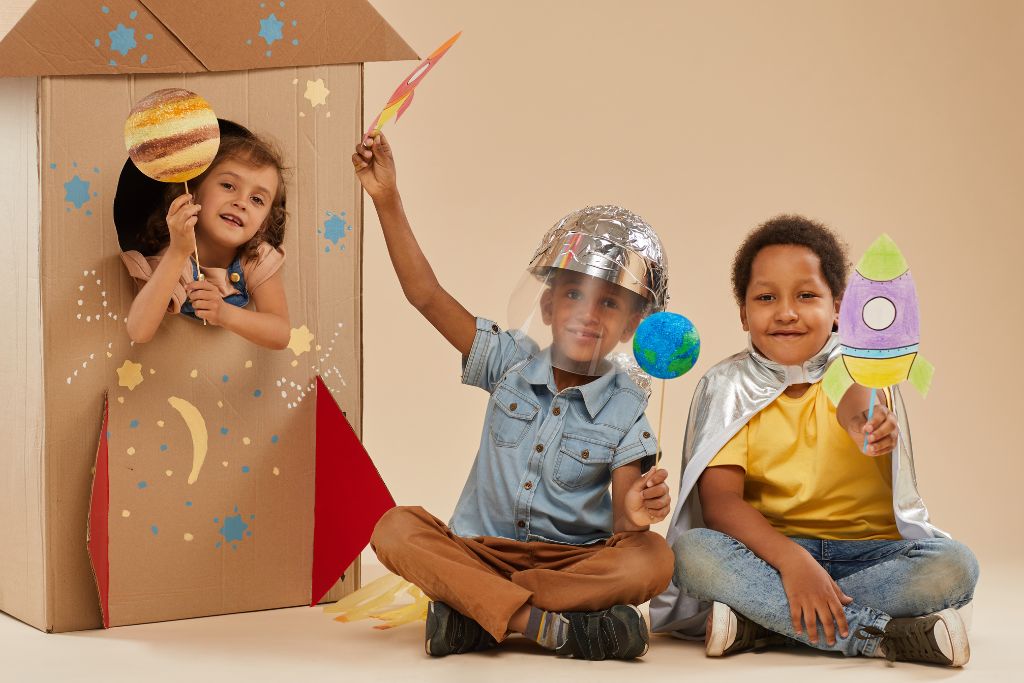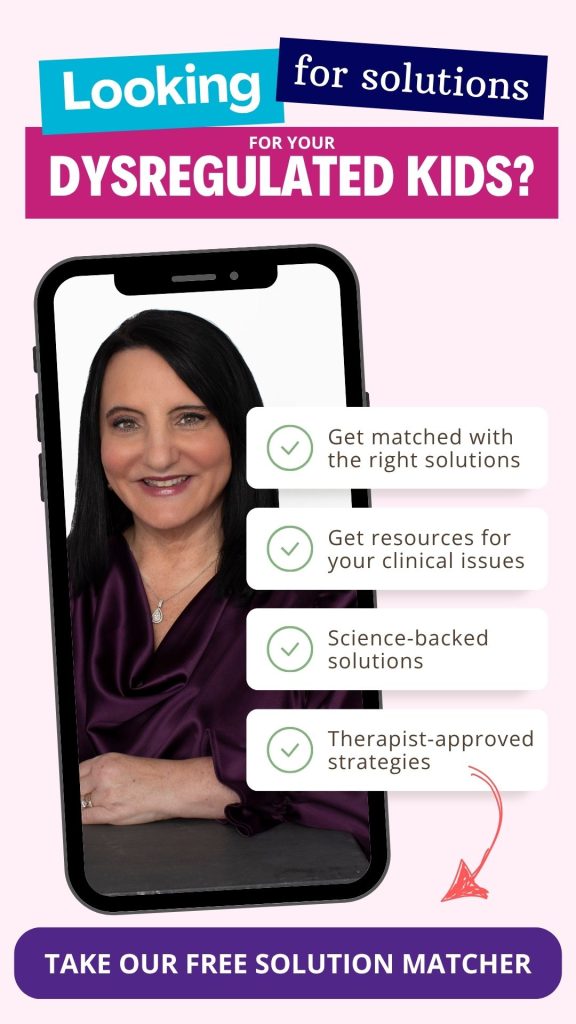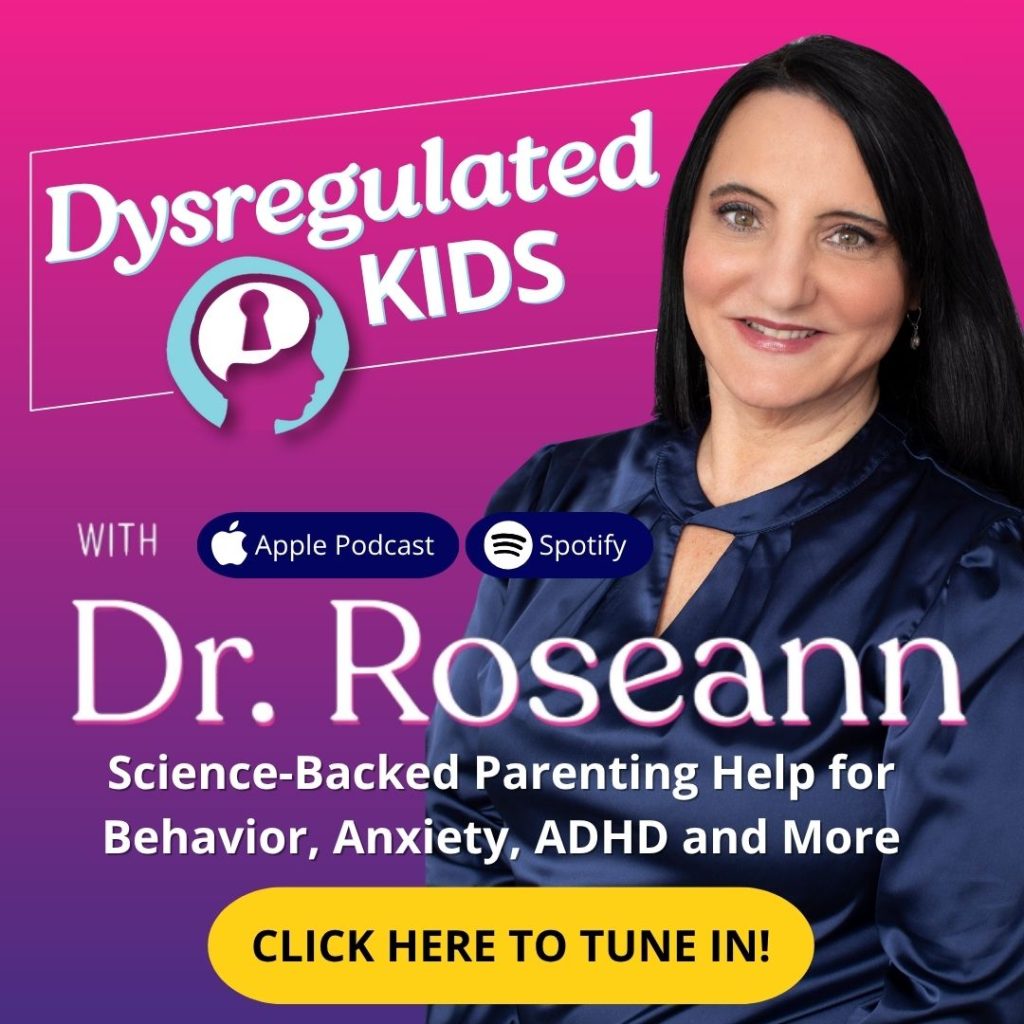
If your child used to breeze through homework but now seems to freeze up at simple tasks, it’s not because they’re lazy or defiant — it may be a signal their brain is overwhelmed. When a child’s nervous system is dysregulated, even basic thinking tasks like paying attention or remembering instructions can become hard.
In this blog, let’s understand what these cognitive symptoms of dysregulation look like, why they happen, and practical steps to help your child’s brain calm down.
You’re not alone — support and effective tools are available.
What are cognitive symptoms of dysregulation in children?
“A dysregulated brain can’t learn or listen right away. It’s too busy trying to survive.”
When a child’s brain is “flooded and unsteady,” thinking becomes difficult.
Cognitive dysregulation hijacks the brain’s ability to plan, remember, and focus – all the skills a learner needs.
In everyday life, this can look like:
- Difficulty focusing or following directions – Your child may “zone out” mid-task or feel overwhelmed by multi-step instructions.
- Forgetfulness or memory lapses – They might forget what they were doing or lose track of simple routines (like the steps in getting dressed) whenever stress kicks.
- Brain fog or “blank stare” – Kids often go blank or stare off when anxious or overstimulated.
- Trouble planning or problem-solving – Even organizing a daily routine or finishing homework can feel impossible when the brain is overloaded.
- Getting “stuck” on things – You might see repetitive thoughts or behaviors (perseveration) and refusal to move on from one activity.
I remember how Misa, a mom of a 9-year-old, noticed her daughter Luna would cry and quit whenever any unexpected change happened. At first Misa thought Luna was being stubborn, but then she realized Luna truly couldn’t remember the new instructions.
Behavior is communication – Luna’s meltdown was her brain’s way of saying, “I need help to process this.”

How can dysregulation affect my child’s thinking, focus, and learning?
Even smart, capable children can have their thinking skills hijacked by stress. When the brain is in “alarm mode,” the very circuits for attention and learning slow down.
Teachers might see a once-eager student suddenly blank out on tests, spend hours on easy homework, or be unable to start a project. At home you might notice:
- Easily distracted or “zoning out.” Your child drifts off during class or at the dinner table. They may seem to daydream or answer a question with a blank stare.
- Trouble starting or finishing tasks. A simple chore or homework assignment becomes overwhelming. They might sit for a long time without doing anything, or leave assignments half done.
- Difficulty switching gears. Moving from one activity to another (like play to homework) can trigger meltdowns or complete shutdowns.
- Slow or faulty problem-solving. Even small problems (missing a puzzle piece, a change in routine) can lead to big reactions because the brain can’t adapt quickly under stress.
Why does my child forget instructions or become confused?
Stress doesn’t just change feelings – it also dumps working memory. Working memory is the “sticky note” in the brain that holds information long enough to use it.
When a child’s nervous system is dysregulated, that sticky note is wiped clean as soon as an upsetting thought or noise comes along.
In practice, this looks like:
- Instructions vanish mid-task. You ask your child to get dressed and brush teeth, and suddenly they’ve done neither. Not laziness – their brain literally forgot in the moment.
- Forgetfulness spikes under stress. After an argument or a frustrating moment, they might even forget their own name or what they were trying to say.
- “Stuck” attention. Sometimes the brain “locks on” to one thought (worry about a test, for example) and can’t move on to the actual task at hand.

Could ADHD, anxiety, or sensory overload be causing these problems?
Yes — these conditions often go hand-in-hand with cognitive dysregulation. In fact, cognitive dysregulation is frequently a symptom in kids with ADHD, anxiety, autism, OCD or PANS/PANDAS. But it’s important to know: dysregulation itself is not a separate diagnosis, it’s a sign the brain’s system is off-balance.
Think of it like this: ADHD is the car, and cognitive dysregulation is the flat tire. That means even if your child has ADHD (or anxiety), their executive functions (focus, memory, planning) can still go on “pause” when stress is high.
As Dr. Thomas Brown puts it, “It can look like defiance, but often it’s a child’s brain struggling to organize information.”
- With ADHD, you’ll see impulsivity and fidgeting, but also a dysregulated child who can’t calm their thinking even when they try.
- With anxiety or sensory issues, intense feelings or loud environments can trigger “shutdown.” A child may freeze, refuse, or cover their ears (like in the image above) when overwhelmed, not because they’re defiant but because they feel unsafe.
- Co-occurring issues like sleep problems, asthma flares, or digestive upset can also sap cognitive energy, because the brain is busy handling discomfort.
In any case, we always want to calm the brain first before pushing tasks. The strategies work whether there’s a formal diagnosis or not. You might hear, “He’s just being stubborn,” but remember: behavior is usually communication. Your child’s brain is trying to tell you it needs help organizing its thoughts.
How do I know if my child’s behavior is dysregulation, not defiance?
Dysregulation often mimics tantrums or oppositional behavior, but the cause is different.
Look for patterns:
- Meltdowns over small things. If the slightest change (a toy moves, a routine shifts) triggers a meltdown, it’s likely to overwhelm, not meanness.
- Tantrums or “no!” at reasonable requests. A child might scream “I’m not doing that!” to things they normally do, because the extra demand feels like too much.
- Emotional shutdowns. Some kids just shut down – they might refuse to speak or say “I can’t.” This is their brain’s way of conserving energy when it feels under attack.
- If behavior problems happen mostly when the child is tired, sick, or anxious, it’s a clue the nervous system is the issue.

What practical steps can help my child’s overwhelmed brain?
Before expecting focus or cooperation, start by calming the body. Here are action-oriented tips:
- Take regular brain breaks. Schedule short breaks between tasks. Let your child jump, stretch, or do a favorite calming game for 2–5 minutes. Even a quick walk or a few deep breaths can reset an overwhelmed brain.
- Break tasks into tiny steps. Use checklists, visual schedules, or simple drawings so your child only has to focus on one thing at a time. For example, for bedtime: “1. Brush teeth. 2. Put on pajamas. 3. Read a story.”
- Create a calm corner. Have a quiet, cozy spot at home with a weighted blanket, stuffed animals, or noise-canceling headphones. When your child feels overloaded, this “safe zone” can help them settle.
- Use soothing activities first. If your child resists, try co-regulation: sit with them quietly, rub their back, or sing softly to help lower anxiety before asking anything difficult. “Let’s calm the brain first,” Roseann advises.
- Keep routines consistent. Kids feel safer (and think better) when days are predictable. Use alarms, timers or visual charts so your child knows what’s coming next.
- Promote brain-friendly habits: Regular sleep, a balanced diet, and physical activity all support a calmer mind. Even hydration can improve concentration.
- Validate feelings and use simple language. Say, “I see you’re upset, let’s breathe together,” instead of punishment. This empathy itself helps the nervous system feel understood.
When should I seek help for my child’s cognitive struggles?
Trust your instincts. If your child’s forgetfulness or focus issues are steady, severe, and affecting daily life, it’s wise to get extra support. You might consider help if:
- Schoolwork or social life suffer. Grades are dropping, or teachers report frequent meltdowns or shutting down in class.
- Symptoms last a long time. If your child has struggled like this for months (not just a few bad days), professional advice can offer strategies you haven’t tried.
- Interferes with safety or health. For example, if they bolt out of a store during a meltdown, or obsessively focus on something to the point of risk.
- You feel overwhelmed, too. If the situation is causing a lot of stress for the whole family, a specialist (like a pediatric psychologist or a child psychiatrist) can work with you on a plan.
Seeking an evaluation is not admitting failure — it’s gathering knowledge. A professional can check for things like ADHD, anxiety, or learning differences and will also teach you how to support your child’s brain. Remember: “You’re not alone,” and having a team (teacher, doctor, coach) can make a big difference. With understanding and the right tools, most kids learn to manage these symptoms over time.
Pro Tip: It helps to describe specific behaviors to any professional (“She blanked out and screamed at the math book”), and mention situations (“after soccer practice” or “during tests”). This gives clues about triggers and proper support.
Parent Action Steps
Create a calm-down routine your child can use after school or when overwhelmed (e.g., quiet time + sensory tool + soft music). Use visual schedules to break tasks into simple steps and reduce cognitive overload. Model calm responses — your regulation helps teach your child how to regulate.
FAQs
Who should I talk to if I think my child is dysregulated?
Start with your pediatrician, school counselor, or a licensed mental health professional. They can help assess what’s going on and guide you toward next steps.
How long does it take to see improvement?
Every child is different, but with consistent calming strategies, many families notice small changes in 2–4 weeks. Bigger shifts take time, but early wins are encouraging.
Can this get worse if I don’t address it?
Yes, if ignored, chronic dysregulation can lead to school struggles, anxiety, or low self-esteem. Early support helps prevent long-term effects.
Is dysregulation the same as a diagnosis?
No, dysregulation is a symptom — not a standalone diagnosis. It can happen with ADHD, anxiety, or even in kids with no diagnosis at all.
What if teachers think my child is just being lazy or oppositional?
Share what you’re observing at home. Ask for a meeting to talk about signs of stress, not just behavior. Many teachers welcome more understanding once they know.
Are there risks to waiting too long to get help?
Delays can impact your child’s confidence, learning, and relationships. The sooner the brain gets support, the easier it is to build regulation skills.
Do I need medication to fix this?
Not necessarily. Many children respond well to natural tools like routines, calming strategies, and nervous system support. Medication may be part of a broader plan, but it’s not the only option.
Citations
Emotion dysregulation in early childhood predicts later psychopathology: Becker, S. P., Lunkenheimer, E. S., Davis, A. L., & McLaughlin, K. A. (2025). Early emotion regulation predicts later ADHD, conduct, and anxiety symptoms: A 4-year longitudinal study. Development and Psychopathology, 37(3), 520–534. https://doi.org/10.1017/S0954579425000123
Emotional outbursts and neurodevelopmental conditions: Gabriels, R. L., Agnew, J. A., Beresford, C., & Wamboldt, M. Z. (2021). The importance of emotion regulation in understanding challenging behaviors in children with autism and other neurodevelopmental disorders. Journal of Autism and Developmental Disorders, 51(2), 459–472. https://doi.org/10.1007/s10803-020-04538-4
Self-regulation skills as protective factors: Eisenberg, N., Spinrad, T. L., & Valiente, C. (2016). Emotion-related self-regulation and its relation to children's maladjustment. Annual Review of Clinical Psychology, 12, 167–197. https://doi.org/10.1146/annurev-clinpsy-021815-093335
Dr. Roseann Capanna-Hodge is a licensed mental health expert that is frequently cited in the media:
- Scary Mommy: “What Is Self-Regulation in Children, And How Can You Help Improve It?”
- USA Today: “How to Build Emotional Intelligence in Your Child”
- Homeschool OT Therapy Services: Understanding nervous system dysregulation in children
Disclaimer: This article is not intended to give health advice and it is recommended to consult with a physician before beginning any new wellness regime. *The effectiveness of diagnosis and treatment vary by patient and condition. Dr. Roseann Capanna-Hodge, LLC does not guarantee certain results.
Are you looking for SOLUTIONS for your struggling child or teen?
Dr. Roseann and her team are all about science-backed solutions, so you are in the right place!
Get our 7-day science-backed mini course reset to calm your child’s brain:


%20.png)















